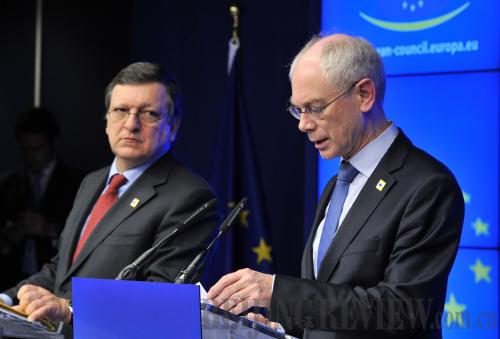|
 |
|
SANCTION AGREEMENT: European Council President Herman Van Rompuy (right) and European Commission President Jose Manuel Barroso attend a press conference after the European Summit in Brussels on January 30, 2012, when EU leaders endorsed restrictive measures against Iran adopted by the EU Foreign Ministry on January 23 (XINHUA) |
Western countries escalated economic sanctions against Iran recently. On January 23, the EU announced a ban on member states to import or transport crude oil from Iran as of July 1. However, viewed in the context of the global energy market and the situation of the world economy, the economic sanction could not only injure Iran, but also backfire on the global economy.
No doubt, Iran will be the largest and the most direct victim of the sanction, for oil is the lifeline of the country's economy. At present, Iran produces 3.6 million barrels of oil daily, and exports 2.6 million barrels a day. Oil exports account for as high as 80 percent of the total exports in Iran, and 50 percent of government revenue comes from oil exports. The ban on exports of oil and crude oil will necessarily create tremendous difficulties for its exports, and will further cause great losses to its economy.
However, the sanctions imposed against Iran have stricken by no means only Iran, but also the global economy, including Western countries. The oil embargo against Iran is highly likely to incur a rise in oil prices, which will bring about new difficulties for world economic recovery.
The year 2011 marked the lasting soaring prices of oil, mainly caused by wars in the Middle East, especially in Libya. Statistics from the Organization of the Petroleum Exporting Countries (OPEC) showed that price of oil averaged $107 per barrel last year, a rise of 14 percent compared with 2008 and a historic high.
The International Monetary Fund (IMF) recently forecast that international oil prices may possibly increase by 20 percent to 30 percent if the oil sanctions against Iran declared by Western countries lead to a halt of oil exports from Iran.
If international oil prices are kept at present level, the global economy may rise 3 percent to 3.5 percent this year, said Adam Sieminski, chief energy economist at Deutsche Bank AG based in Washington. "If oil prices are hiked to $125 per barrel, the world economic growth would drop to 2.5 percent, and if the price climbs to $150, it would have a catastrophic result for the global economy," Sieminski said.
The American economy will also suffer a great loss. The United States has long imposed economic sanctions against Iran, and never imported oil from this country due to tensions existed over the past years between the two countries.
However, as the world's largest oil importer, the United States is not able to escape the negative influence of soaring oil prices. Statistics showed that, due to high-level oil prices, the United States spent $125 billion more in imports of oil and petroleum products last year compared with 2010. Driving prices higher yet would no doubt create new difficulties for the American economic recovery.
The EU, dealt a heavy blow by debt crises, is the initiator to impose the oil embargo against Iran, and may become one of the biggest victims of the move.
The EU has long been one of the major oil importers from Iran, with its current oil imports accounting for 20 percent of Iran's oil exports. One third of oil in Greece and over 10 percent oil in both Italy and Spain comes from Iran.
If EU member states stopped importing oil from Iran, the shortage of oil will have a negative impact on their already suffering economies. Meanwhile, an oil price hike incurred by the sanction will, in turn add new difficulties to the already debt-ridden countries.
In addition, once Iran imposes revenge measures, such as halting commodity imports from EU member states, economy in EU countries would sustain yet another blow.
The Middle East serves as the most important oil producing region in the world. Each day, one-fifth of world oil, or 17 million barrels of oil, will be transported through Hormuz Strait. Western countries, therefore, should ward off the global economic disaster triggered by blindly imposing sanctions against Iran.
(Source: Xinhua)
| 